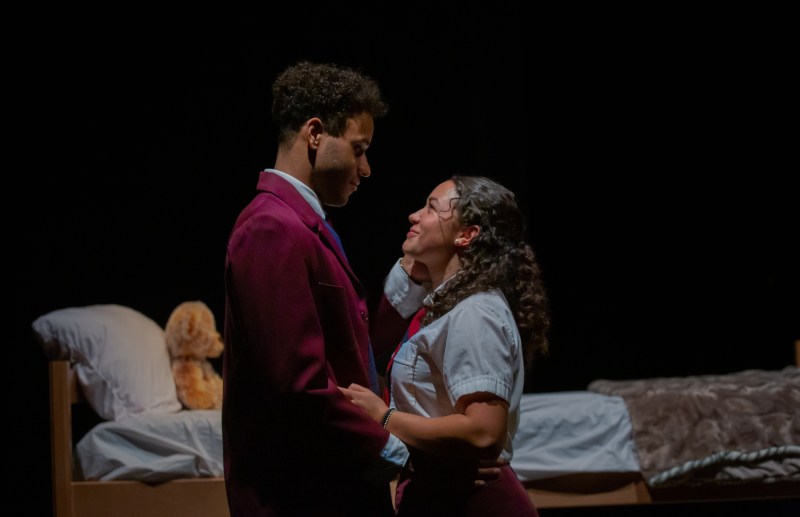“I want you to give me instructions,” Nya begs her teenage son Omari, who faces potential criminal charges for attacking his teacher. “I will take a bullet for you… I will steal the sky for you.”
With emotive delivery of powerful lines, BLACKstage’s rendition of Dominique Morisseau’s play “Pipeline” stunned the crowd on Saturday. Directed by Eryn Perkins ’25, it marked the organization’s return to fostering Black inclusion through theater after several years of hiatus. And the production did not disappoint. Talented acting and thought-provoking designs brought to life a moving story of the school-to-prison pipelines that Black youths face in America today, a topic especially relevant during Black History Month.
The storyline of Morisseau’s play itself is short of novel, but it’s concrete and relatable nonetheless. The performance begins with single mother Nya (Lingarbel Brempong ’24) leaving Omari’s father Xavier a voice message, quickly letting the audience know that Omari (Dylan Moore ’24) is in trouble.
Nya works at a school in a Black neighborhood that is plagued with restless teenagers, some of whom have violent tendencies. Wanting Omari to gain a better education away from this environment, Xavier (Ammar Alinur ’23) pays for him to attend a private school. There, Omari feels singled out by his teacher, who treats him as a spokesperson for the Black and single-parent experiences.
Each of the characters face issues that relate to and extend beyond their racial identities, making them tangible to a diverse audience. Omari feels that he does not belong in his white-majority school and is angered by his father’s absence in his life. Nya wants to save her son from facing legal consequences for his third physical attack but struggles to meet his emotional needs.
On top of these concerns lie romantic desires: as Nya longs for the return of her ex-husband, Omari navigates through a rocky relationship with his similarly frustrated girlfriend Jasmine (Aliya Lipsky ’26).
The actors clearly embodied these internal and external conflicts with stellar performances complemented by the intriguing costume design of Christina Benjamin ’24. Moore’s body language — pacing around the room or hastily shoving books into his backpack — highlighted Omari’s impulsive nature. The characteristic was further driven home by his denim jacket and T-shirt, the latter which had “Revolution” written on it.
Most of all, I was impressed by Xavier’s outfits. From the first time he walked into the room with wire glasses, a gray plaid blazer and matching dress pants, I understood that he was a white-collar worker who left a problematic neighborhood and wanted his son to do the same.
As a poetry fan, I was greatly intrigued by the play’s use of Gwendolyn Brooks’ poem “We Real Cool” as a metaphor for Black identity throughout. The 10-line poem is first used by Nya to teach her students the danger of rejecting education and resorting to violence, drugs and sex. She faces the audience when addressing her students; effectively, the audience becomes her pupils as she teaches them the systemic racism facing Black youth.
As Nya makes her remarks to the class, an ominous recording of the poem plays in the background. Behind her, Omari echoes the lines of the poem while standing on a shabby table, as if on trial (set design by Mary-Tyler Mosley ’25; sound design by Peter Li ’25). This motif recurs throughout the play, with Omari’s image representing Nya’s inner fear of him realizing the prophecy in the last lines of the poem: “We / Die soon.”
The production was by no means flawless. I would have appreciated several characters enunciating their lines more clearly, and the crew moving props in between scenes slightly disrupted the audience’s immersion in the performance.
As for the play itself, it never explicitly ties its title back to its theme of the school-to-prison pipeline. It also plays with the idea that social media exacerbates existing systemic racism by enabling the spread of videos that distort the truth (such as a video of Omari hitting the teacher, when in reality the altercation was only a push). I would have liked to see further developments of this discussion of the impact of social media beyond a few mentions here and there.
Nevertheless, when Omari hands his mother a list of open-ended parenting instructions (some of which are contradictory, such as “Know when to back off” and “Know when to keep pushing”) at the end of the play, I was left satisfied with the resolution of the mother-son conflict. Although the audience did not get a clear answer to what happened to Omari in the end, the hopeful resolution was sure to warm the hearts of many.
Editor’s Note: This article is a review and includes subjective thoughts, opinions and critiques.
